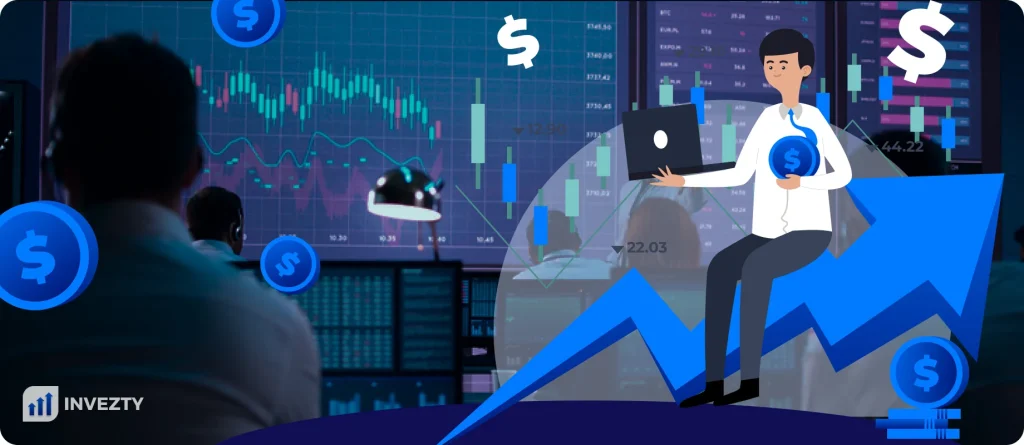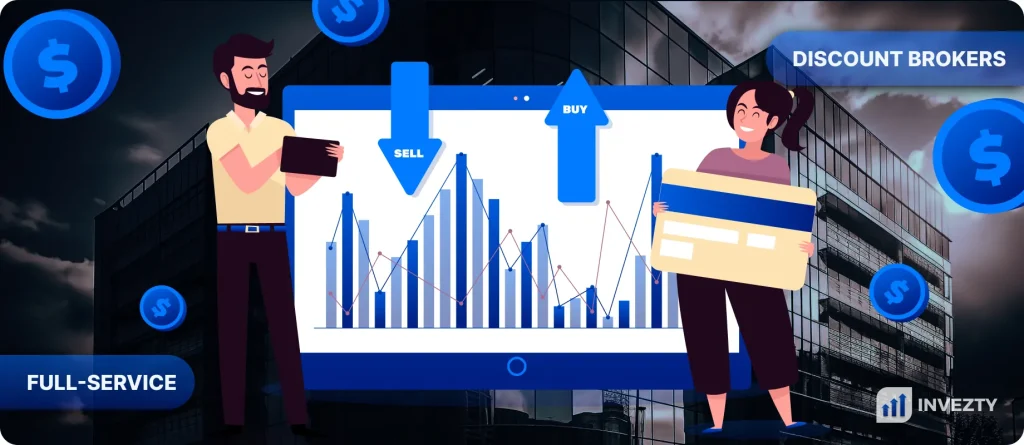Thadeus Geodfrey is a leading voice in the financial industry. You’ll appreciate the expert ease with which he does this. He deciphers the intricate link between emotions and behavior in trading and investment. With extensive experience as a senior trading writer, Thadeus imparts his knowledge and confidence to guide your trading boat. He’ll make you conquer your fears, break barriers, and capitalize on every potential opportunity. Follow his pieces and develop your knack for trading.
We may receive compensation from our partners for placement of their products or services, which helps to maintain our site. We may also receive compensation if you click on certain links posted on our site. While compensation arrangements may affect the order, position or placement of product information, it doesn’t influence our assessment of those products.
Picking the right trading broker is a crucial step on your journey to mastering and dominating the markets. A good broker means more than just tight spreads and instant trade executions. Sure, spread and execution speed are important when picking a broker, but they’re only part of the equation.
Today, we’ll get into the whole ball of wax and show you how to find a good broker to bolster your success as a trader. We’ve covered everything here.
What Is a Trading Broker?

Financial markets are decentralised, meaning no single authority or organisation controls them. Instead, a network of financial institutions (banks, hedge funds, institutional investors, etc.) interacts through various global platforms. Retail traders—the smallest market players—access these financial networks through trading brokers.
A trading broker, or brokerage firm, is essentially the middle person between the buyers and sellers of financial instruments. These brokerage firms invest in high-powered technologies to facilitate trading for millions of traders worldwide, allowing them access to different markets. In turn, traders pay the brokers a small fee through commissions or spreads.
What Kind of Broker Do You Need?
Whether you’re a beginner or a veteran trader, you need a trading broker that aligns with your trading style, skill level, and overall trading style. You also need a reliable broker with minimal downtime and fast trade executions. Steer clear of brokers lacking transparency and have a shaky reputation in the trading community.
How to Find a Good Broker

Thanks to technological advancements and high-speed internet, there are hundreds, if not thousands, of trading brokers to choose from. However, the plethora of options makes choosing the right one a tad difficult. Here are a couple of factors to consider when choosing a broker.
License and Regulation
The first and most important factor to keep in mind when choosing a broker for trading is proper licenses and regulations. Traders invest a lot of money into different financial markets. The last thing you want is to put your hard-earned cash into the hands of unscrupulous brokerage firms.
Licenses guarantee that the broker abides by stringent legal and regulatory standards that financial authorities stipulate. Different jurisdictions require different licenses. The more licenses a broker has, the more trusted and credible the broker is. It also means that the broker has the green light to operate in different jurisdictions. Look for a broker with licenses from the FCA, ASIC, and similar authorities.
Trading Platforms and Tools
You’ll want a broker with a trading platform you’re used to. Otherwise, you’ll have difficulty executing trades and taking full advantage of the platform’s tools and features. If you usually trade with MetaTrader 4 (MT4), find a broker supporting this tool.
It’s also a good idea to pick a broker that supports multiple trading platforms so that you can dabble with different platforms and find one that suits you best. Beginners will also benefit immensely from brokers with copy trading platforms. This allows them to copy more experienced traders and make a serious killing.
Market Variety
Top-tier brokers usually offer various financial instruments to trade. And while most traders specialise in specific financial instruments, it doesn’t hurt to have a little variety. That way, you can diversify your investment portfolio at your convenience. Starters can also play around with different markets before they pick which one(s) to invest in. Find a broker that offers currencies, stocks, indices, options, and even cryptocurrencies.
Trading Fees
Trading fees are a murky affair when choosing forex brokers. Naturally, you’ll want a broker with the least trading fees because it means bigger profit margins. However, suspiciously low trading fees are a huge red flag. Most brokers with super low fees usually compromise on many aspects of their services or are illegitimate brokers looking to swindle your cash.
That said, look for a broker with reasonable trading fees, not too high or too low. Some brokers don’t charge commissions but instead charge spreads. Since spread is the difference between the bid/buy and sell/ask price, lower spreads mean lower trading costs.
Brokers may charge both spreads and commissions. So, while the broker may have low commissions, they might have higher spreads. Pay attention to both the spread and commission to ensure you’re not minimising your profits. The broker’s trading fee structure should also align with your trading style. Scalpers (day traders), for instance, should find brokers with low spreads since they execute multiple trades daily. These spreads add up with every trade and might eat into their profits.
Customer Support
There’s no guarantee that you’ll always have seamless trades, even with the best trading broker. Downtimes and service interruptions are commonplace with most brokerage firms. In such cases, you’ll need a helpful and reliable customer service agent to help you address these issues.
Choose a broker with fast, responsive customer service. The broker should also have multiple channels for traders to contact customer support. You can learn more about a broker’s customer service by reading online reviews or contacting them directly. Brokers that only have chatbots for their customer support are bad news. Find one that has a direct customer support line that you can contact at your convenience.
Besides communication channels, look at the broker’s customer service availability. Many brokers offer 24/5 customer service, but some also offer 24/7 availability. While 24/7 customer service is better, it may be unnecessary for traders who only trade during the weekdays.
Compatible Trading Platform and Tools
As mentioned, you’re better off using a broker with trading platforms you’re familiar with. Brokerage firms either have proprietary trading platforms, third-party platforms, or both. These platforms typically have various tools that traders can leverage to boost their trades. Some of these tools include technical analysis indicators, stop-loss and take-profit orders, and financial calendars, to name a few.
It’s worth noting that you’ll most likely use only a handful of the available tools. But you never know when you need to expand your trading knowledge horizon; the extra tools might come in handy someday.
Reputation
While trying a broker is the best way to figure out if it’s right for you, some research can help steer you in the right direction. Top-notch brokers have a stellar reputation in the trading community and usually attract thousands of traders from across the globe.
Read through online reviews and testimonials before choosing a broker. However, only stick to authority review sites and read reviews on the broker’s site with a grain of salt. Some brokers write their own reviews to dupe unsuspecting traders.
Educational Resources
To become a successful trader, you must continuously learn. This explains why the best trading brokers offer tons of educational content, from articles and blog posts to video tutorials and interactive lessons. The educational resources are vital for growing and succeeding as a trader.
Check the broker’s educational resources before opting for a brokerage firm. It’s not just about the volume of educational material the broker has but also about the quality of the said materials. It’s hard to go wrong with brokers offering comprehensive guides, expert lessons, and demo accounts. Brokers with outdated and unstructured educational materials, on the flip side, are not worth your time.
Full-Service Vs. Discount Brokers

Trading brokers boil down to two main types: full-service and discount brokers. The main difference between the two is the range of services they provide. While full-service brokers have a wide range of tools, features, and services, discount brokers provide a basic interface to trade but have lower commissions and spreads.
Discount brokers usually charge a flat nominal fee for their services. Full-service brokers, on the other hand, usually charge a commission, a fraction of the trade value, as the service fee. So, which one should you choose, a full-service or discount broker?
Full-service brokers are best suited for seasoned traders with a concrete understanding of the financial market they trade. These traders can utilize the various tools, features, and educational resources to make more informed trades. If you’re new to trading and just need an avenue to make trades, then a discount broker is perfect. However, some may argue that the tools and resources available in full-service brokers will help beginners get off on the right foot.
FAQs
The easiest way to tell whether a broker is good is by reading online reviews and testimonials. Traders share their experiences with brokers on review sites like Trustpilot, Apple’s App Store, and Google Play.
Traders are the individuals or entities who buy and sell financial products for profit. Brokers, on the other hand, are the platforms or organizations that facilitate trading. Brokers are intermediaries that give traders access to various markets and oversee trades.
Retail traders like you can’t access the financial markets directly. They need a broker that bridges traders to the global financial markets. Unless you’re super rich or an institution, It’s almost impossible for you to trade financial products without a broker.
The commission is the most important fee to pay attention to when choosing a broker. Also, pay attention to the spreads and swap/rollover fees. The deposit, withdrawal, and inactivity fees are also worth your consideration.
Online testimonials and reviews are by far the best and simplest ways to learn about a broker’s reputation. You can also inquire about the same on online trading forums and discussions.
Conclusion
Finding a trading broker is no Herculean task, but finding the right one is easier said than done. And while you can pick the first broker that shows up when you search Google for the best trading broker on Google, you might bite off more than you can chew.
A good broker aligns with your trading style and strategy and is also transparent and reliable. Hopefully, with the information above, you now know how to choose a broker for your specific needs. Remember, the broker you opt for can make or break your trading endeavours. So take your time to look through all the options and opt for the best one.
